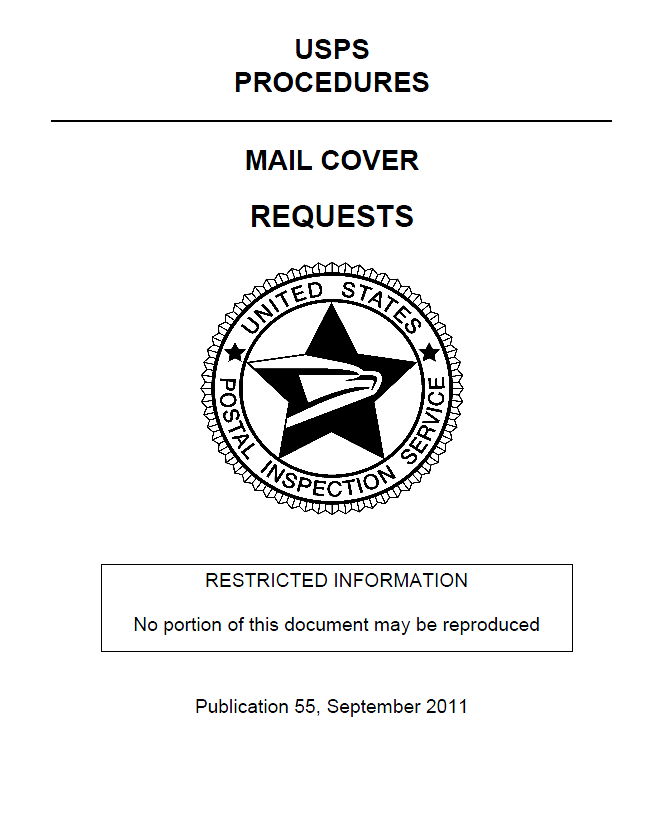The following documents are the most recent version of U.S. Postal Service Publication 55 on Mail Cover Requests and the accompanying form for law enforcement agencies to request mail covers. A previous version of the procedures and form from 2006 were published in 2010 by Cryptome. The documents available below were obtained from a public government training website.
| USPS Procedures Publication 55 Mail Cover Requests | 16 pages | September 2011 | Download |
| External Law Enforcement Agency Request for Mail Cover | 5 pages | September 2011 | Download |
This publication provides instructions to law enforcement agencies requesting a mail cover as part of a criminal investigation. All conditions and procedures contained in these instructions must be met before a mail cover can be authorized.
…
A. Cover Categories
Mail covers are issued only to agencies empowered by statute or regulation to conduct criminal investigations and are strictly controlled to assure proper use. They are not to be used as an initial investigative step.
Mail covers are restricted to the following categories of investigations:
1. To protect national security against actual or potential threats to the U.S. by a foreign power or its agents. (Note: Only those agencies with national security investigative authority may request covers in this category through the U. S. Postal Inspection Service’s Office of Counsel).
2. To locate a fugitive.
3. To acquire evidence of a commission or attempted commission of a crime punishable by one year or more in prison (felony violations).
4. Obtain evidence of a violation or attempted violation of a postal statute.
5. To assist in the identification of property, proceeds or assets forfeitable because of a violation of criminal law.
B. Mail Contents and Disclosure
Approved mail covers authorize the recording of information from the outside wrappers or envelopes of sealed and unsealed classes of mail. Mail covers do not authorize the search, seizure or opening of any class of mail. Mail in USPS custody may be seized and its contents examined only under authority of a properly executed federal search warrant or a legally recognized exception to the warrant requirement. Only postal personnel are authorized to record information relevant to mail covers. Information should only be disclosed at the express direction of the Inspection Service. The existence of a current mail cover maintained on a particular subject may be disclosed to another law enforcement agency upon request. Such disclosure is permissible as a “routine use” under the Postal Service Privacy Act regulations and is consistent with Inspection Service liaison policy. Provided the request otherwise meets the requirements for mail cover authorization, accumulated cover information on the subject may be disclosed.
C. Regulations Compliance
Each request is reviewed to ensure that it contains enough information to stand alone as full justification for the cover and fully complies with all regulation requirements.
Extensions: Requests for time extensions of approved mail covers must state the investigative benefits gained from the original request and anticipated to be obtained from the extension. A mail cover will be extended beyond the initial time period of the original where sufficient justification is provided. Extensions, if approved, can be granted in 30-day periods (60 day periods for fugitives), not to exceed 120 days. Mail Cover extensions beyond 120 days must be approved by the Chief Postal Inspector. The request for extension must state whether the subject has been indicted or an information filed and if the subject is represented by an attorney.
D. Submission Requirements
Once a request is approved, mail cover data is provided on PS Form 2009, Information Concerning Mail Matter or photocopied by the Postal Service and attached to PS Form 2009. These forms, with photocopy attachments, if any, remain USPS property and must be returned to the CISC Manager within 60 days after the termination date of the cover. Reproduction of these forms, with photocopy attachments, if any, is prohibited.

